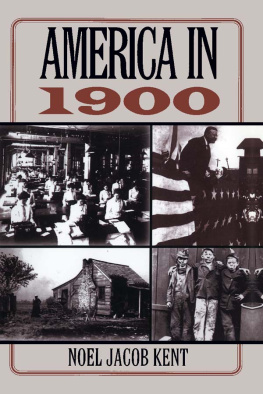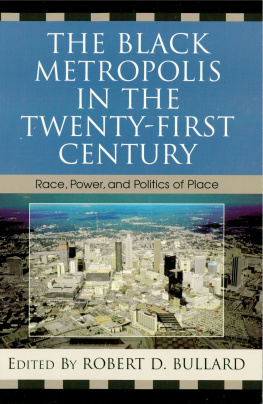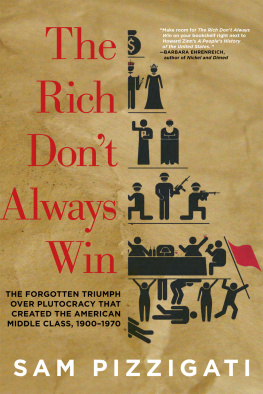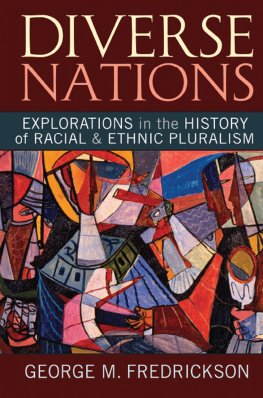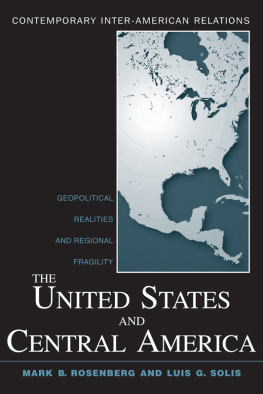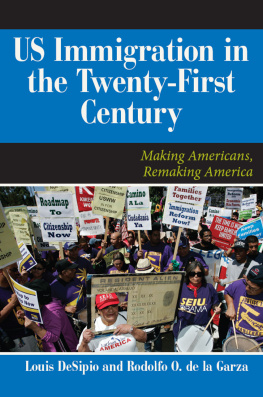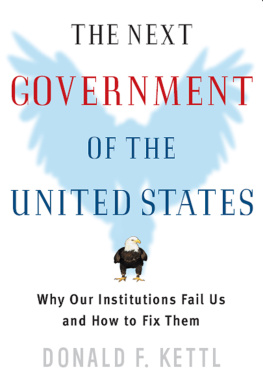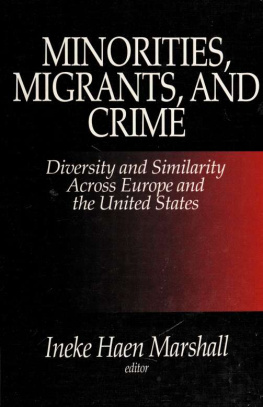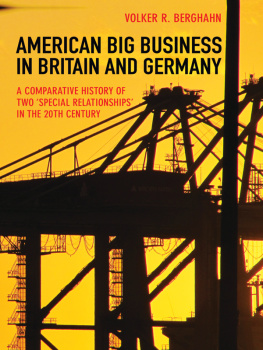AMERICA IN
1900
AMERICA IN
1900
NOEL JACOB KENT
First published 2002 by M.E. Sharpe
Published 2015 by Routledge
2 Park Square, Milton Park, Abingdon, Oxon OX14 4RN
711 Third Avenue, New York, NY 10017, USA
Routledge is an imprint of the Taylor & Francis Group, an informa business
Copyright 2002 Taylor & Francis. All rights reserved.
No part of this book may be reprinted or reproduced or utilised in any form or by any electronic, mechanical, or other means, now known or hereafter invented, including photocopying and recording, or in any information storage or retrieval system, without permission in writing from the publishers.
Notices
No responsibility is assumed by the publisher for any injury and/or damage to persons or property as a matter of products liability, negligence or otherwise, or from any use of operation of any methods, products, instructions or ideas contained in the material herein.
Practitioners and researchers must always rely on their own experience and knowledge in evaluating and using any information, methods, compounds, or experiments described herein. In using such information or methods they should be mindful of their own safety and the safety of others, including parties for whom they have a professional responsibility.
Product or corporate names may be trademarks or registered trademarks, and are used only for identification and explanation without intent to infringe.
Library of Congress Cataloging-in-Publication Data
Kent, Noel J.
America in 1900 / Noel Jacob Kent.
p. cm.
Includes bibliographical references and index.
ISBN 0-7656-0595-3 (hardcover: alk. paper) ISBN 0-7656-0596-1 (pbk. : alk. paper)
1. United StatesHistory18651921. 2. United StatesCivilization18651918.
3. Nineteen hundred, A.D. I. Title.
E711.K46 2000
973.88dc21
99-089342
ISBN 13: 9780765605962 (pbk)
ISBN 13: 9780765605955 (hbk)
For Chelsea and Daniel
And in memory of my father,
Alexander Kent
Table of Contents
The field work for this study was aided immeasurably by grants from the National Endowment for the Humanities and the University of Hawaii Manoa Research Relations Fund and Social Sciences Research Institute. My thanks to the staffs of the University of Hawaii at Manoa Library, the Library of Congress, the Smithsonian Institution, the Wisconsin State Historical Society, the Oregon State University Library, Portland State University Library, Honolulu and Seattle Public Libraries, the Hagley Museum, the University of WisconsinMadison Library, the University of Washington Library, and the Bancroft Library at the University of California Berkeley for their patient and gracious treatment of an often confused stranger who wandered into their midst. I owe special thanks to Norma Kent, Edie and Frank Mahlmann, Jonathan Okamura, William Chaloupka, Franklin Odo, Lynn Sasaki, Peter Manicas and Jeremy Bentley for their support at various times during the course of this project.
This study is a looking glass into the United States circa 1900. It is concerned with understanding the nations trajectory as the nineteenth century turned into the twentieth, the lives that different kinds of Americans were living, and how various perspectives and myths helped them to interpret and cope with the changes they were experiencing.
These changes were profound, indeed. What was locking into place, as the English historian Geoffrey Barraclough has written in An Introduction to Contemporary History (Pelican, N. Y, p. 16), were the basic structural changes which have shaped the modern world. In the United States, a series of overlapping revolutions in business, technology, and communications and the movement of people out of rural areas to cities were altering the countrys physical and psychological landscapes. The way Americans worked and played was being transformed. Convinced as they were that theirs was the country of the future, Americans still remained divided about what that future might look like and how to reach it. Massive labor unrest sparked by growing social inequalities and an epidemic of racial violence in both the North and South exposed some of the nations faultlines. Doubts were appearing (even among those welcoming the United States new role as a world power) about the wisdom of soldiers in blue fighting a protracted war in the remote Philippines.
This work is also about making connections between then and now, of utilizing the years around 1900 as a mirror for reflecting upon our own time. This might seem a curious venture. After all, looking back from 2000, the United States of a century ago seems enormously remote, framed in photogravure images of top-hatted gentlemen clad in Prince Albert frock coats and whalebone-corseted ladies carrying lace-trimmed parasols, John Philip Sousa marches, and houses bedecked with towers and cupolas.
And the twentieth century has, of course, witnessed phenomenal transformations. What then were sleepy, backwater towns are now sprawling metropolises. Far-flung suburbs, superhighways, airports, and satellite dishes dot our external landscape. Computers, CD players, televisions, and faxes are fixtures in our homes and offices. The rhythms of daily life have altered beyond recognition, as have the vocabulary and symbols we use to give meanings to things.
Nevertheless, one might wonder if a 1900 Bostonian or San Franciscan suddenly catapulted into the Massachusetts Avenue or Market Street of today would not be terribly surprised by the way things have turned out. Certainly, they would marvel at the range and sophistication of year 2000 machines and technologies, not to mention the abundance currently available to Americans. None of this, however, would be incomprehensible. After all, by the year double-zero, the Industrial Revolution was already rolling along in high gear, Americans were becoming accustomed to adaptation as a way of life, and a consumer revolution was emergent on the horizon.
By no coincidence, it was also around the beginning of the twentieth century that the core dilemmas that confront us today were appearing more or less full-blown. Geoffrey Barraclough says it well: Contemporarary history begins when the problems which are actual in the world today first take visible shape. In that sense, we are still living in the same epoch as the Americans of 1900 (An Introduction to Contemporary History, p. 20).
Our travelers in time, in fact, scanning this mornings headlines or television news would find much that resonates. Charges of monopoly practices against Bill Gates and Microsoft might easily recall the bitter controversy during their own time surrounding the machinations of John D. Rockefellers Standard Oil Company, or Henry Havemeyers American Sugar. Mergers on the scale of Exxon and Mobil would sound quite familiar. Reports of U.S. military action in the Middle East or the Balkans might conjure up the war in the Philippines. News stories about technological breakthroughs, trade disputes with China and Europe, racial problems and violence in Chicago or Texas, high levels of crime and frequent shootings, rising income gaps between rich and poor, volatile stock market prices, homelessness in the cities, the dangers of immigration, the controlling role of special interest money in elections and on Capitol Hillall would have something dj vu about them.
So for all the water that has flowed under the national bridge during the last century, a core of 1900s most complex and difficult issues remain salient unto our own day. If this has a logic of sorts, it is that, contrary to Henry Ford, history is not bunk, and that the United States as it entered the twenty-first century was still being shaped by what had both happened and not happened as it entered the twentieth.

